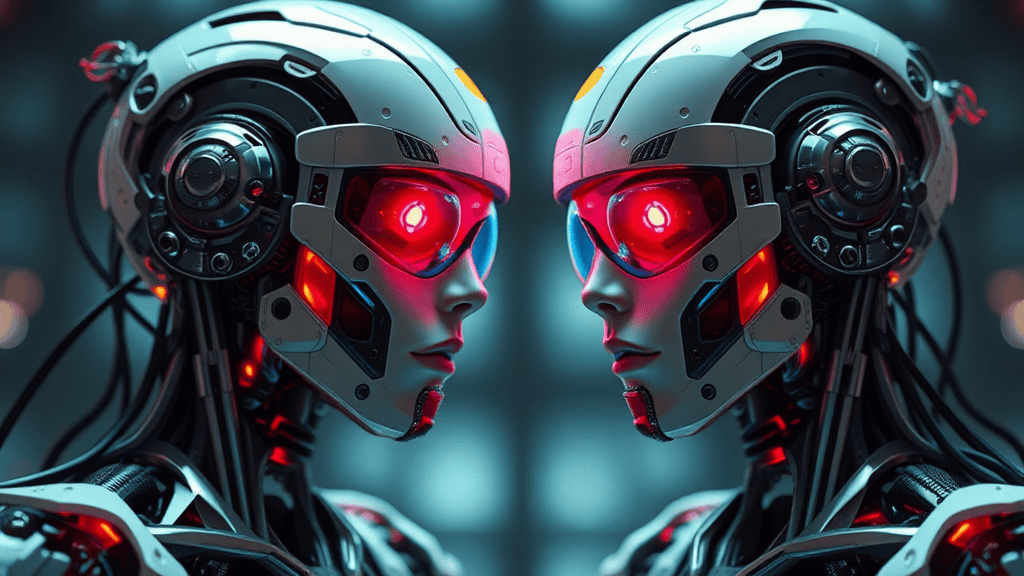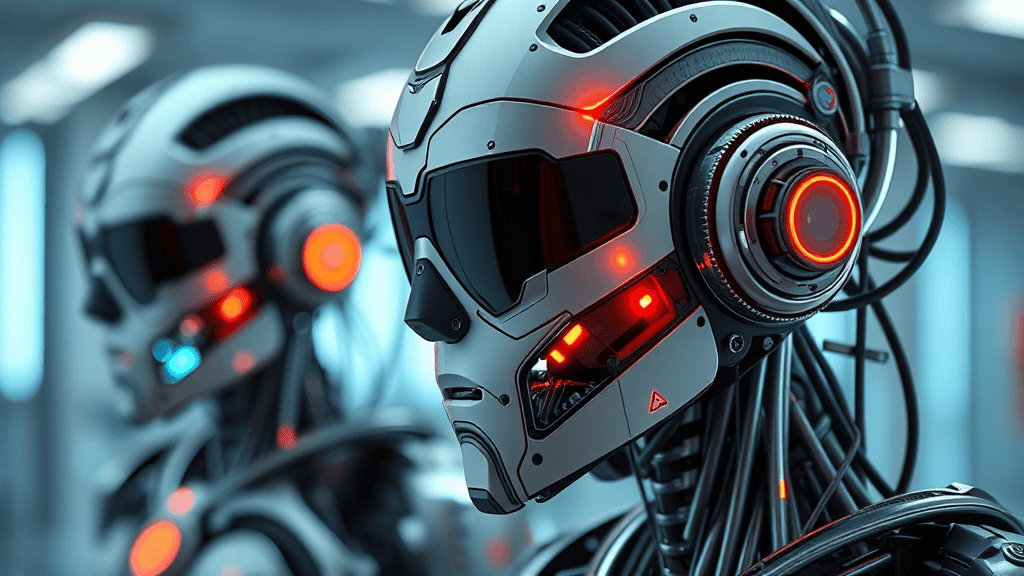Table of Contents
Can Democracy Survive in an Age of AI?
The Central Dilemma Facing Society
As we venture deeper into the **age of artificial intelligence**, a pressing question arises: Can democratic structures endure amid this **technological transformation**? This article delves into the intricate relationship between democracy and AI, posing critical concerns about accountability and transparency in decision-making processes.
Key Points of Exploration
- The potential clash between AI’s rapid evolution and democratic principles
- Harari’s insights on information networks and their societal implications
- Recommendations for safeguarding democracy against the influence of AI
Top Trending AI Tools
This month, various sectors are showcasing their advancements in AI technology. Below is a list of the top trending AI tools across different domains:
- AI Search Engines
- AI Website Builders
- Customer Service AI Tools
- Generative Art Tools
- AI Copywriting Tools
- Marketing AI Tools
AI in Democracy
Polls
By 2024, over 60 countries will use AI in electoral processes, affecting nearly half of the global population.
Impact
Only 19 out of 100+ national elections since 2023 showed AI interference, with no significant changes in election results.
EU Act
The EU’s Artificial Intelligence Act aims to regulate AI systems based on risk levels, ensuring respect for fundamental rights and democracy.
Future
AI may significantly alter financial systems by late 2020s, potentially making them too complex for human comprehension.
PopularAiTools.ai

Exploring the Vital Queries of Modern Information Networks
Why Do Smart Humans Make Poor Choices?
Yuval Noah Harari, a renowned historian and the mind behind the compelling new book Nexus: A Brief History of Information Networks from the Stone Age to AI, delves into crucial questions regarding human intelligence and decision-making. Despite our advanced knowledge and capabilities, he highlights a paradox:
- Humans possess immense intelligence, constructing planes, bombs, and complex technologies.
- Simultaneously, they face self-destructive behaviors that threaten civilization and ecological balance.
- Harari warns against attributing these issues to flaws in human nature, as it fosters a dangerous sense of irresponsibility.
Understanding the Role of Information Networks
Harari posits that the world’s foundational systems stem from various information networks.
- These networks enable the functioning of currency, religion, nation-states, and artificial intelligence.
- However, their architecture often leads to adverse outcomes, amplifying the risks tied to humanity’s technological advances.
Concerning Human Decision-Making in the Age of Information
Most individuals are inherently good; they make poor decisions mainly due to misinformation. Harari points out that:
- While we accumulate vast amounts of data, the quality of the information itself often remains dubious.
- Modern civilizations are as vulnerable as ancient tribes to collective fallacies.
- The idea that more information equals truth is flawed—most information is unreliable and can even incite delusions.
The Implications of Artificial Intelligence
In Nexus, Harari identifies artificial intelligence as a double-edged sword and emphasizes its complex nature:
- AI epitomizes the most intricate and unpredictable information framework ever devised.
- Its influence will reshape identities and societal organization in ways we cannot yet fully grasp.
The Unknowns of AI’s Cultural and Societal Impact
AI’s emergence means cultural outputs, once created by human minds, are now increasingly fashioned by inorganic intelligences. Harari illustrates this using the game Go:
- The AI AlphaGo defeated world champion Lee Sedol, employing strategies no human had previously considered.
- This victory revealed how AI explored uncharted territories of the game, showing it can uncover new paradigms within existing frameworks.
This transformation is not limited to games; fields like finance could similarly face paradigm shifts, wherein AI develops financial constructs far beyond human comprehension.
Democracy and Accountability in an AI-Driven World
Harari warns of the potential consequences AI poses for democratic institutions:
- Democracy hinges on accountability, which relies on understanding the reasoning behind decisions made by AI systems.
- If humans cannot comprehend the basics—like why a bank rejects a loan application based on an algorithm—it undermines the very fabric of democratic systems.
The Rapid Evolution of AI
Harari compares digital evolution to organic evolution, emphasizing its speed:
- Organic evolution has unfolded over billions of years, while digital evolution is progressing at a pace millions of times faster.
- The AI of today is merely at its nascent stage, likened to the simplest forms of life in a long evolutionary journey.
Make Money With AI Tools
Are you looking to explore innovative ways to earn income? With the rise of artificial intelligence, there are numerous opportunities to leverage AI tools for financial gain. Here’s a list of some exciting side hustle AI tools that can help you get started on your journey to making money:
Side Hustle AI Tools Ideas
- Passive Income With AI Influencers
- Create Your Own AI Automation Agency
- Create Your Own Content Agency
- Create Your Own Ad Creative Agency
- Create Voice Overs For Clients

AI Tool Articles You Might Like
- Top Trending Tools This Month
- Best AI Marketing Tools
- Best AI Website Builders
- AI Courses
- AI for Startups: Top Tools
- AI Headshot Generators
- Boost Productivity with AI
- Best AI Tools for Digital Marketing
- 10 AI Tools Reinventing Copywriting
- Best AI Marketing Tools
- 11 Best AI Voice Generators
- 6 Best AI Video Editing Tools
- 7 Best AI Tools for Career
- Print on Demand Midjourney Course
- 11 Best AI Voice Generators
Understanding the Role of Information Networks
Harari emphasizes that information networks are fundamental to human societies, enabling the functioning of systems such as currency, religion, nation-states, and artificial intelligence. These networks have been crucial since the Stone Age, through the canonization of the Bible, early modern witch-hunts, Stalinism, Nazism, and the resurgence of populism today.
Concerning Human Decision-Making in the Age of Information
Despite the accumulation of vast amounts of data, the quality of information remains a significant issue. Harari notes that most information is unreliable and can incite delusions, highlighting historical examples like the Malleus Maleficarum, which spread rapidly due to the printing press and led to witch-hunt hysteria.
The Implications of Artificial Intelligence
AI represents the most intricate and unpredictable information framework ever devised. It has the potential to reshape identities and societal organization in profound ways. For instance, AI systems like AlphaGo have demonstrated capabilities beyond human comprehension, such as defeating a world champion in Go by employing previously unconsidered strategies.
The Unknowns of AI’s Cultural and Societal Impact
The rapid advancement of AI is transforming various fields, including finance, where AI can develop financial constructs that are beyond human understanding. This transformation underscores the need for transparency and accountability in AI-driven decision-making processes.
Democracy and Accountability in an AI-Driven World
Harari warns that the lack of transparency in AI decision-making processes can undermine democratic institutions. If humans cannot comprehend the reasoning behind AI-driven decisions, such as loan application rejections, it erodes the accountability that democracy relies on.
The Rapid Evolution of AI
Digital evolution is occurring at a pace millions of times faster than organic evolution. Current AI systems are at a nascent stage, comparable to the simplest forms of life in a long evolutionary journey. This rapid evolution highlights the urgent need for informed choices to prevent adverse outcomes.
Recent Trends or Changes in the Field
The current information revolution is the most profound in human history, with AI forming a new nexus for information networks. This revolution is characterized by the spread of misinformation and the increasing influence of non-human intelligence on human societies.
Notable Expert Opinions or Predictions
Harari argues that while information revolutions can foster human progress, they also come with significant drawbacks, such as the dissemination of unreliable or harmful information. He proposes solutions like prohibiting bots from impersonating humans and encouraging collaboration between artists and bureaucrats to help navigate computer networks.
Economic Impacts or Financial Data
While specific financial data is not provided in Harari’s work, the impact of AI on financial systems is highlighted as a significant area of concern. AI‘s ability to develop complex financial constructs could lead to paradigm shifts in finance, potentially disrupting traditional financial structures and requiring new regulatory frameworks.
Frequently Asked Questions
1. Why do smart humans make poor choices?
Yuval Noah Harari explains that even intelligent individuals can make poor choices due to complex factors. Despite their capability to create sophisticated technologies, they often engage in self-destructive behaviors that jeopardize civilization and ecological stability. He emphasizes that:
- Humans have remarkable intelligence, capable of building advanced technologies.
- Self-destructive actions pose significant threats to society.
- Attributing these issues to flaws in human nature can lead to a irresponsible mindset.
2. What role do information networks play in society?
According to Harari, information networks are fundamental to the functioning of our world. These networks facilitate:
- Currency systems
- Religious constructs
- Nation-states
- Artificial intelligence
However, he warns that the architecture of these networks can lead to adverse consequences, amplifying risks associated with technological advancements.
3. How does misinformation affect human decision-making?
Harari argues that most people are inherently good, but they often make poor choices due to misinformation. He notes that:
- The quality of information available is often questionable.
- Contemporary societies are vulnerable to collective fallacies.
- More information does not guarantee truth; in fact, it can lead to delusions.
4. What are the implications of artificial intelligence (AI)?
In his book Nexus, Harari presents AI as a double-edged sword. He explains that:
- AI represents an intricate and unpredictable information framework.
- Its influence will reshape identities and societal structures significantly.
5. How does AI impact culture and society?
Harari illustrates AI’s impact by citing the game Go, where:
- AI AlphaGo defeated world champion Lee Sedol using unprecedented strategies.
- This victory showcases AI’s ability to explore new paradigms within existing frameworks.
This transformation is applicable beyond games, as AI could redefine fields such as finance.
6. What challenges does AI pose to democracy?
Harari warns that AI poses several potential challenges to democratic institutions, including:
- Accountability, which relies on understanding AI decision-making processes.
- A lack of comprehension of AI decisions can destabilize democratic practices.
7. How does digital evolution compare to organic evolution?
Harari states that digital evolution occurs at an unprecedented rate compared to organic evolution. Key points include:
- Organic evolution unfolds over billions of years.
- Digital evolution progresses millions of times faster.
- Current AI is at a nascent stage, akin to the simplest forms of life in an evolutionary continuum.
8. Why is understanding AI critical for accountability?
Understanding how AI systems operate is fundamental for maintaining accountability in society. If individuals cannot grasp the rationale behind AI decisions, such as loan rejections by banks, it undermines key democratic values.
9. What are the risks of relying on AI-generated information?
Harari highlights that AI-generated information can be manipulative and may not always reflect truthful representations. The reliance on such information can lead to:
- Misperceptions within society.
- Heightened susceptibility to collective fallacies.
10. How can society safeguard democratic values in an AI-driven world?
To protect democratic values, society must ensure transparency in AI system operations and maintain human oversight. It is essential to understand AI’s roles and impacts on decision-making processes to foster accountability and trust.
